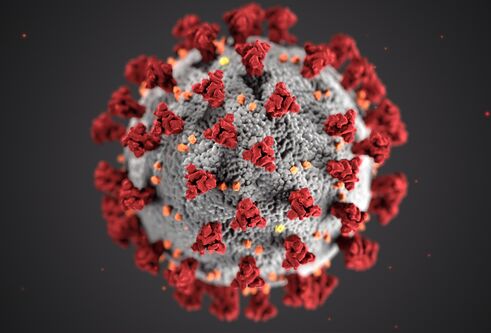Professor Karim Labib
Chair of Genome Integrity
Genome Integrity, School of Life Sciences
MRC PPU, School of Life Sciences

Contact
Websites
Biography
Karim studied Natural Sciences at the University of Cambridge, before moving to Oxford as a PhD student with Paul Nurse. Subsequently, Karim spent periods as a postdoctoral fellow with Sergio Moreno in Salamanca, Stephen Kearsey in Oxford and John Diffley in London. In 2001, Karim started his group at what is now the Cancer Research UK Manchester Institute. Karim was selected to join the EMBO Young Investigator Programme in 2004, and in 2010 Karim was elected a member of EMBO and received the Hooke medal from the British Society for Cell Biology.
Karim moved as Professor of Genome Integrity to Dundee in 2013 and was elected a fellow of the Royal Society of Edinburgh in 2016. In addition to his research, Karim serves as ‘Head of Sustainability and Climate Action’ for the School of Life Sciences.
Research
Chromosome duplication and genome integrity
All life on Earth depends on cells copying their chromosomes with exquisite fidelity, to preserve the integrity of the genetic blueprint that is encoded in DNA. Chromosome duplication is especially challenging in species with large genomes such as humans, where each cell has to copy around six billion base pairs of DNA, before the sister chromatids are segregated to opposite poles of the cell during mitosis. We study how cells achieve this amazing feat, by regulating the assembly and disassembly of the replication machinery, protecting the replication machinery at sites of DNA damage, and rapidly processing sites of incomplete replication during mitosis to facilitate successful chromosome segregation.
Although the replication machinery has been very highly conserved during eukaryotic evolution, important differences of regulation have also emerged, and our lab focusses on mechanisms that are specific to animal cells. We take a multi-disciplinary approach to studying such mechanisms, ranging from reconstituted biochemistry and structural approaches, to in vivo approaches in the early embryo of the nematode Caenorhabditis elegans, combined with studies in mammalian cells. The remarkable efficiency of genome maintenance breaks down in human cancer and tumour cells are often riddled with mutations and structural rearrangements of their chromosomal DNA. A deeper understanding of the intimate links between chromosome duplication and genome integrity is likely to inspire new approaches to cancer treatment in the future.
Selected Publications
- Fujisawa, R. and Labib, K.P.M. (2024) TTF2 drives mitotic replisome disassembly and MiDAS by coupling the TRAIP ubiquitin ligase to Polε. bioRxiv, https://doi.org/10.1101/2024.12.01.626218.
- Villa, F., Ainsworth, J. and Labib, K.P.M. (2024) USP37 protects mammalian cells during DNA replication stress by counteracting CUL2-LRR1 and TRAIP. bioRxiv, https://doi.org/10.1101/2024.09.03.610971.
- Polo Rivera, C., Deegan, T. and Labib, K.P.M. (2024) CMG helicase disassembly is essential and driven by two pathways in budding yeast. The EMBO Journal, 43(18):3818-3845. doi: 10.1038/s44318-024-00161-x.
- Evrin C., Alvarez V., Ainsworth J., Fujisawa R., Alabert C. and Labib K.P.M. (2023) DONSON is required for CMG helicase assembly in the mammalian cell cycle. EMBO Rep. e57677. doi: 10.15252/embr.202357677.
- Xia, Y., Sonneville, R., Jenkyn-Bedford, M., Ji, L., Alabert, C., Hong, Y., Yeeles, J.T.P. and Labib, K.P.M. (2023) DNSN-1 recruits GINS for CMG helicase assembly during DNA replication initiation in C. elegans. Science, doi:10.1126/science.adi4932.
- Jenkyn-Bedford M, Jones ML, Baris Y, Labib KPM, Cannone G, Yeeles JTP, Deegan TD (2021) A Conserved Mechanism for Regulating Replisome Disassembly in Eukaryotes Nature 600 743-747 doi:10.1038/s41586-021-04145-3 PMID: 34700328
- Xia Y, Fujisawa R, Deegan TD, Sonneville R, Labib KPM (2021) TIMELESS-TIPIN and UBXN-3 promote replisome disassembly during DNA replication termination in Caenorhabditis elegans The EMBO Journal e108053 doi:10.15252/embj.2021108053 PMID: 34269473
- Villa F, Fujisawa R, Ainsworth J, Nishimura K, Lie-A-Ling M, Lacaud G, Labib KP. (2021) TRAIP and p97 control CMG helicase disassembly in the mammalian cell cycle EMBO Rep e52164 doi:10.15252/embr.202052164 PMID: 33590678
- Le TT, Ainsworth J, Polo Rivera C, Macartney T, Labib K (2021) Reconstitution of human CMG helicase ubiquitylation by CUL2LRR1 and multiple E2 enzymes Biochem J BCJ20210315 doi:10.1042/BCJ20210315 PMID: 34195792
- Tom D Deegan, Pragya P Mukherjee, Ryo Fujisawa, Cristian Polo Rivera, Karim Labib (2020) CMG helicase disassembly is controlled by replication fork DNA, replisome components and a ubiquitin threshold Elife 9 e60371 PMID: 32804080
- Deegan, T, Baxter, J, Ortiz Bazan, M, Yeeles, JTP & Labib, K (2019) Pif1-Family Helicases Support Fork Convergence during DNA Replication Termination in Eukaryotes Mol Cell 74 231-244 PMID: 30850330
- Sonneville, R, Bhowmick, R, Hoffmann, S, Mailand, N, Hickson, ID & Labib, K (2019) TRAIP drives replisome disassembly and mitotic DNA repair synthesis at sites of incomplete DNA replication. eLife 8 1-19 PMID: 31545170
- Deng, L, Wu, RA, Sonneville, R, Kochenova, OV, Labib, K, Pellman, D & Walter, JC (2019) Mitotic CDK Promotes Replisome Disassembly, Fork Breakage, and Complex DNA Rearrangements. Mol Cell 73 915-929 PMID: 30849395
Teaching
Contributes lectures / tutorials to:
- Advanced Gene Regulation and Expression– year 4
and also provides supervision for:
- Honours student projects
- Rotation projects for Masters students
- PhD projects for graduate students
Environmentally Sustainable Research
Karim Labib is Head of Sustainability and Climate Action for the School of Life Sciences and chairs the EMBO Lab Sustainability Award Advisory Board.
Media availability
I am available for media commentary on my research.
Chromosome replication and genome integrity
Contact Corporate Communications for media enquiries.
Areas of expertise
- Cancer
Second supervisor
Awards
| Award | Year |
|---|---|
| Major Personal Funding Awards / Wellcome Discovery Award | 2024 |
| Major Personal Funding Awards / CRUK Programme Discovery Award | 2023 |
| Fellow of the Royal Society of Edinburgh | 2016 |
| Major Personal Funding Awards / CRUK Programme Discovery Award | 2016 |
| Major Personal Funding Awards / Wellcome Investigator Award | 2013 |
| Member of the European Molecular Biology Organisation | 2010 |
| National Sciences Prizes awarded since 1990 / British Society of Cell Biology Hooke Medal | 2010 |
Stories
News
On the 10th anniversary of the San Francisco Declaration on Research Assessment (DORA), six panellists reviewed the initiative's impact on the way research is assessed
News
Seven new papers have been published this month in The Biochemical Journal, representing a major collaboration between multiple groups at the Francis Crick Institute in London, University College London and The University of Dundee.

News
Life Sciences researcher Professor Karim Labib has been awarded £2million to explore the role that one of the most fundamental processes in cell biology plays in cancer.